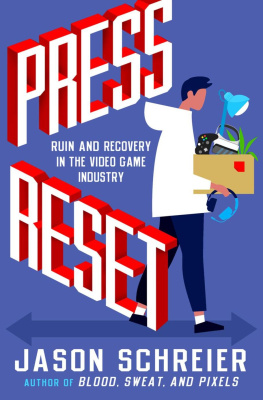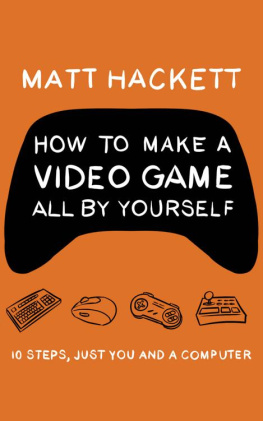The information provided in this book is based on sources that the author believes to be reliable. All such information regarding individual products and companies is current as of May 2021.
Copyright 2021 by Jason Schreier
Cover design and illustration by Philip Pascuzzo
Cover copyright 2021 by Hachette Book Group, Inc.
Hachette Book Group supports the right to free expression and the value of copyright. The purpose of copyright is to encourage writers and artists to produce the creative works that enrich our culture.
The scanning, uploading, and distribution of this book without permission is a theft of the authors intellectual property. If you would like permission to use material from the book (other than for review purposes), please contact permissions@hbgusa.com. Thank you for your support of the authors rights.
Grand Central Publishing
Hachette Book Group
1290 Avenue of the Americas, New York, NY 10104
grandcentralpublishing.com
twitter.com/grandcentralpub
First edition: May 2021
Grand Central Publishing is a division of Hachette Book Group, Inc. The Grand Central Publishing name and logo is a trademark of Hachette Book Group, Inc.
The publisher is not responsible for websites (or their content) that are not owned by the publisher.
The Hachette Speakers Bureau provides a wide range of authors for speaking events. To find out more, go to www.hachettespeakersbureau.com or call (866) 376-6591.
Print book interior design by Thomas Louie
Library of Congress Cataloging-in-Publication Data
Names: Schreier, Jason, author.
Title: Press reset : ruin and recovery in the video game industry / Jason Schreier.
Description: New York, NY : Grand Central Publishing, [2021]
Identifiers: LCCN 2020054028 | ISBN 9781538735497 (trade paperback) |
ISBN 9781538735480 (ebook)
Subjects: LCSH: Video games industry. | Video gamesDesign.
Classification: LCC HD9993.E452 S37 2021 | DDC 338.4/77948dc23
LC record available at https://lccn.loc.gov/2020054028
ISBNs: 978-1-5387-3549-7 (trade paperback); 978-1-5387-3548-0 (ebook)
E3-20210413-DA-NF-ORI
Table of Contents
Navigation
To Safta, for everything
Explore book giveaways, sneak peeks, deals, and more.
Tap here to learn more.

The success of the video game industry over the past few decades has been, by any metric, astronomical. Even calling it success feels understated, like saying that summers in New York City smell bad or that going into labor is painful. In the 1970s, video games barely existed; in the 2020s, they make up the most lucrative and perhaps most influential industry in entertainment. By 2021, video games were generating a whopping $180 billion in global revenue per year. They had just as significant an impact on popular culture, from Fortnite invading schools across the world to Nintendo Direct livestreams dominating social media with big announcements and top-notch memes.
Video games are big business. And for anyone who grew up playing and loving them, its tempting to dream about being part of that business. Theres a Far Side comic from the 1990s in which two parents watch a young boy enraptured by Super Mario Bros. and imagine a set of classified ads for jobs that require elite video game skills. Back then, the idea of Nintendo proficiency translating into money made for a good punch line; today, the only piece of that comic that seems unrealistic is someone looking for jobs in a newspaper. People all across the world are now paid to go into an office and bring video games to lifesketching out characters, designing levels, and writing code to make everything function. Its an exciting prospect, and countless bright-eyed gamers want to be part of it.
I once walked into a video game studio in downtown New York City a few months before it was due to release its next game. One artist beckoned me over to his desk to check out something really cool. Soon a crowd had gathered around the computer, craning their necks to watch a slick, realistic model of a truck roll along a drab gray surface. The artist clicked his mouse a few times and the truck exploded, tires and shards of metal flying across the screen in grisly slow motion. I couldnt muster up quite as much excitement as the designers and programmers around me, but it still made me smile to see how genuinely happy they all seemed to be. Their full-time job was to imagine things and then bring them to life on a computer screen. What could be better?
If only it were all glitz, glamour, and exploding cars. The video game industry has a darker side, one that its bosses dont like to brag about on quarterly earnings calls or at E3 press conferences. Even as game companies gobble up more and more money every year, too many of them struggle to provide stable, healthy environments for their workers. All it takes is one flop or sloppy business decision to lead that billion-dollar game publisher to enact a mass layoff or shut down a development studio, no matter how much money it made that year. Sometimes, a mistake isnt even necessarya big company may lay people off once a project is finished (only to rehire for those same positions a few months later) or to please shareholders in time for the next fiscal quarter (fewer employees mean a cleaner balance sheet).
Volatility has become the status quo. Chat with anyone whos worked in video games for more than a few years and theyll almost certainly have a story about that time they lost their job. Maybe they worked on a game that didnt sell well enough, or they got stuck on a project mismanaged by egomaniacal directors. Maybe their publisher needed to juice the numbers on its newest quarterly earnings report. Maybe they were part of a cost-cutting measure, or a strategic resource realignment, or any of the other jargony euphemisms for You no longer work here. Mass layoffs and studio closures have become as fundamental to the video game industry as Marios jumps or Activisions loot boxes.
In 2017, the nonprofit International Game Developers Association asked around one thousand game workers how many employers theyd had in the previous five years. Among those who worked full-time, the average response was 2.2 employers (freelancers said 3.6), suggesting a level of instability that came as no surprise to anyone with experience in this world. The surveys authors added: Industry churn was also reflected in the limited expectation among employees to remain with their current employers for the long term. Most respondents seemed to expect high job mobility. The following year, reporter James Batchelor at the website GamesIndustry.biz counted up all the jobs lost to game studio closures from September 2017 through September 2018 and found that the number was over one thousandand those were just the ones that had been made public. Working in games has always meant accepting that stable employment is the exception, not the rule.
In exchange for the pleasure of creating art for a living, game developers have to accept that it might all fall apart without much notice. Sean McLaughlin, who has worked in video games since 2006, described it as a constant feeling of anxiety. With all the layoffs Ive dealt with, I get a PTSD-type thing whenever there is an email for an all-hands meeting in an office, he told me in an email. I always think its to announce a studio closure, even though its just the team getting together and hearing about things going on around the studio. Im sure its a common thing among other developers.






![Mark J. P. Wolf (editor) - Encyclopedia of Video Games: The Culture, Technology, and Art of Gaming [3 volumes]](/uploads/posts/book/279290/thumbs/mark-j-p-wolf-editor-encyclopedia-of-video.jpg)

